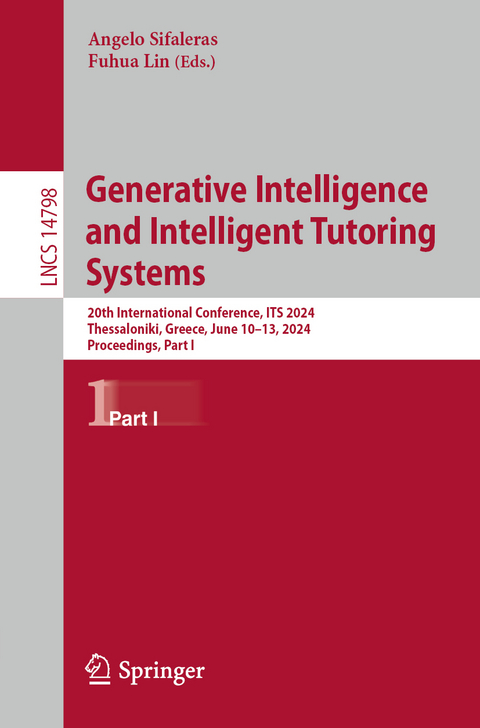
Generative Intelligence and Intelligent Tutoring Systems
Springer International Publishing (Verlag)
978-3-031-63027-9 (ISBN)
This book constitutes the refereed proceedings of the 20th International Conference on Generative Intelligence and Intelligent Tutoring Systems, ITS 2024, held in Thessaloniki, Greece, during June 10-13, 2024.
The 35 full papers and 28 short papers included in this book were carefully reviewed and selected from 88 submissions. This book also contains 2 invited talks. They were organized in topical sections as follows: Generative Intelligence and Tutoring Systems; Generative Intelligence and Healthcare Informatics; Human Interaction, Games and Virtual Reality; Neural Networks and Data Mining; Generative Intelligence and Metaverse; Security, Privacy and Ethics in Generative Intelligence; and Generative Intelligence for Applied Natural Language Processing.
.- Generative Intelligence and Tutoring Systems.
.- Using Large Language Models to Support Teaching and Learning of Word Problem Solving in Tutoring Systems.
.- A Generative Approach for Proactive Assistance Forecasting in Intelligent Tutoring Environments.
.- Combined maps as a tool of concentration and visualization of knowledge in the logic of operation of the Intelligent Tutoring Systems.
.- Fast Weakness Identification for Adaptive Feedback.
.- QuizMaster: An Adaptive Formative Assessment System.
.- Preliminary Systematic Review of Open-Source Large Language Models in Education.
.- Jill Watson: Scaling and Deploying an AI Conversational Agent in Online Classrooms.
.- Improving LLM Classification of Logical Errors by Integrating Error Relationship into Prompts.
.- Enhancement of Knowledge Concept Maps Using Deductive Reasoning with Educational Data.
.- Individualised Mathematical Task Recommendations through Intended Learning Outcomes and Reinforcement Learning.
.- Developing Conversational Intelligent Tutoring for Speaking Skills in Second Language Learning.
.- SAMI: An AI Actor for Fostering Social Interactions in Online Classrooms.
.- Exploring the Methodological Contexts and Constraints of Research in Artificial Intelligence in Education.
.- A Constructivist Framing of Wheel Spinning: Identifying Unproductive Behaviors with Sequence Analysis.
.- Evaluating the ability of Large Language Models to generate motivational feedback.
.- Towards Cognitive Coaching in Aircraft Piloting Tasks: Building an ACT-R Synthetic Pilot Integrating an Ontological Reference Model to Assist the Pilot and Manage Deviations.
.- Impact of Conversational Agent Language and Text Structure on Student Language.
.- Analyzing the role of Generative AI in fostering self-directed learning through Structured prompt engineering.
.- Detecting Function Inputs and Outputs for Learning-Problem Generation in Intelligent Tutoring Systems.
.- Automated Analysis of Algorithm Descriptions Quality, through Large Language Models.
.- An AI-Learner Shared Control Model Design for Adaptive Practicing.
.- Early Math Skill as a Predictor for Foundational Literacy.
.- Explaining Problem Recommendations in an Intelligent Tutoring System.
.- Distributed Feedback in a Tool that Supports Peer-directed Simulation-based Training.
.- Keeping Humans in the Loop: LLM supported Oral Examinations.
.- Generating Learning Sequences Using Contextual Bandit Algorithms.
.- A Generative Artificial Intelligence empowered chatbot: System usability and student teachers' experience.
.- Predicting Rough Error Causes in Novice Programmers using Cognitive Level.
.- Social AI Agents Too Need to Explain Themselves.
.- Students' Perceptions of Adopting Learning Analytics.
.- AI4LA: an Intelligent Chatbot for Supporting Dyslexic Students, Based on Generative AI.
.- EvaAI: A Multi-Agent Framework Leveraging Large Language Models for Enhanced Automated Grading.
.- Optimising a Peer based Learning Environment.
.- Difficulty Estimation and Simplification of French Text Using Large Language Models.
.- LLM-based Course Comprehension Evaluator.
.- Exploring Item Difficulty Prediction: Data Driven Approach for Item Difficulty Estimation.
| Erscheinungsdatum | 07.06.2024 |
|---|---|
| Reihe/Serie | Lecture Notes in Computer Science |
| Zusatzinfo | XXVII, 427 p. 123 illus., 80 illus. in color. |
| Verlagsort | Cham |
| Sprache | englisch |
| Maße | 155 x 235 mm |
| Themenwelt | Schulbuch / Wörterbuch ► Unterrichtsvorbereitung ► Unterrichts-Handreichungen |
| Mathematik / Informatik ► Informatik | |
| Schlagworte | Applied Natural Language Processing • Artificial Intelligence • brain computer interaction • Cognitive Modeling • Data Mining • Educational Games • emotion recognition • Generative Intelligence • Healthcare informatics • human machine interaction • Intelligent Tutoring Systems • Large language model • learning • machine learning • mixed reality • Neural networks • Security and Ethics • Simulation Training • Texte Mining • Virtual Reality |
| ISBN-10 | 3-031-63027-0 / 3031630270 |
| ISBN-13 | 978-3-031-63027-9 / 9783031630279 |
| Zustand | Neuware |
| Informationen gemäß Produktsicherheitsverordnung (GPSR) | |
| Haben Sie eine Frage zum Produkt? |
aus dem Bereich


